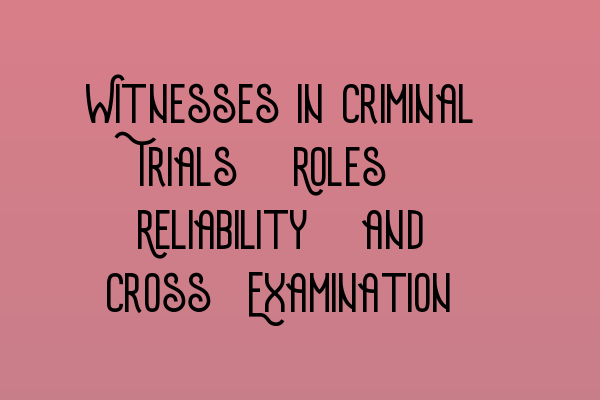Witnesses in Criminal Trials: Roles, Reliability, and Cross-Examination
The Importance of Witnesses
Witnesses play a crucial role in criminal trials. Their testimonies can determine the outcome of a case, as they provide firsthand accounts of events and help establish the truth. In this article, we will explore the roles witnesses play in criminal trials, their reliability, and the process of cross-examination.
Roles of Witnesses
There are different types of witnesses in criminal trials, including eyewitnesses, expert witnesses, and character witnesses.
Eyewitnesses are individuals who have personally witnessed the alleged crime. They provide detailed accounts of what they saw and heard, helping the court understand the sequence of events.
Expert witnesses, on the other hand, are individuals who possess specialized knowledge or skills in a particular field. They are called upon to provide their expert opinions on complex matters related to the case.
Character witnesses are individuals who testify about the defendant’s character. They can provide information about the defendant’s reputation or previous good conduct, which may influence the jury’s perception.
Each type of witness has a unique role to play, and their testimonies are considered valuable evidence in criminal trials.
Reliability of Witnesses
When determining the reliability of a witness, the court considers several factors:
- The witness’s ability to observe and recall events accurately
- The witness’s credibility and reputation
- The presence of any bias or motive to give false testimony
- Corroboration with other evidence in the case
It is essential to assess the reliability of witnesses to ensure the fairness and integrity of the criminal justice system.
Cross-Examination
Cross-examination is a crucial stage in a criminal trial where the opposing party questions the witness’s testimony. This process aims to test the witness’s credibility, expose any inconsistencies or contradictions in their statements, and uncover the truth.
Effective cross-examination requires lawyers to ask relevant and targeted questions, challenge the witness’s recollection, and present contradictory evidence. The goal is to undermine the witness’s credibility and raise doubts about their testimony.
To achieve success in cross-examination, lawyers must be well-prepared, knowledgeable about the case details, and have a strategic approach.
Conclusion
Witnesses play a vital role in criminal trials, providing firsthand accounts and expert opinions that help establish the truth. Assessing the reliability of witnesses and conducting effective cross-examinations are critical in ensuring a fair and just legal process.
For more information on preparing for the SQE exams and other related topics, check out these articles:
- SQE 1 Practice Exam Questions
- SQE 1 Practice Mocks FLK1 FLK2
- SQE 2 Preparation Courses
- SQE 1 Preparation Courses
- SRA SQE Exam Dates
